

Living Poets Digital Library - Google Slides. Poets Respond® On average, poems in Rattle are published six months to a year after they were submitted.
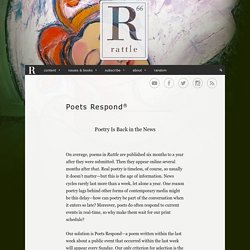
Then they appear online several months after that. Real poetry is timeless, of course, so usually it doesn’t matter—but this is the age of information. News cycles rarely last more than a week, let alone a year. Why High School Students Should Memorize and Recite Poetry. When I first read Marge Piercy’s poem “To be of use,” I fell in love with the last lines: “The pitcher cries for water to carry / and a person for work that is real.”

The analogy resonated with me, with the desire I’ve always felt to have a purpose that goes beyond my own pleasure or entertainment. It also resonated with my belief that students crave this too. I find something surprising and alive in the poem each time I read it, but this year it reminded me of the students I introduce to Poetry Out Loud, a program that “encourages students to learn about great poetry through memorization and recitation.”
These students want to do real work, create something with a result, and hammer away at a project they can count as complete. And memorizing poetry is just the thing. The Easy Guide to Blackout Poetry. It's a quest, isn't it?
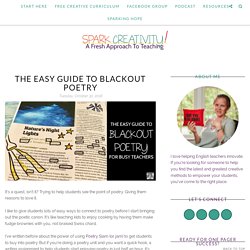
Trying to help students see the point of poetry. Giving them reasons to love it. I like to give students lots of easy ways to connect to poetry before I start bringing out the poetic canon. It's like teaching kids to enjoy cooking by having them make fudge brownies with you, not braised Swiss chard. Whatever Your Classroom, Please Teach More Living Poets. “Get poetry into the high schools!”
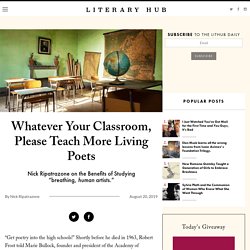
Shortly before he died in 1963, Robert Frost told Marie Bullock, founder and president of the Academy of American Poets, that not merely poetry, but poets belonged in schools. She started the “Poets in the Schools” program in 1966, sending poets like Donald Hall—by then the former poetry editor of The Paris Review—into public schools. Blackout Poetry. There’s something positively thrilling about carrying a pristine bundle of brand new books into your classroom library, introducing them for the first time to wide-eyed students, then seeing this exuberance repeated multiple times — hopefully over many years — on the faces of countless students as they read a great book for the first time.
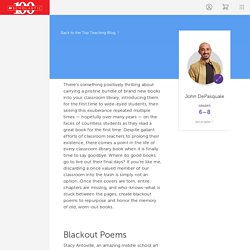
Despite gallant efforts of classroom teachers to prolong their existence, there comes a point in the life of every classroom library book when it is finally time to say goodbye. Where do good books go to live out their final days? If you’re like me, discarding a once valued member of our classroom into the trash is simply not an option. Once their covers are torn, entire chapters are missing, and who-knows-what is stuck between the pages, create blackout poems to repurpose and honor the memory of old, worn-out books.
Blackout Poems Stacy Antoville, an amazing middle school art teacher in New York City, first introduced me to blackout poetry. Poetry Unbound on Apple Podcasts. (1) Daniel Beaty - Knock Knock (Def Jam Poetry) Figures of Thought: Krista Tippett Reads Howard Nemerov’s Mathematical-Existential Poem About the Interconnectedness of the Universe. “A leaf of grass is no less than the journey work of the stars,” Walt Whitman wrote in one of his most beautiful poems in the middle of the nineteenth century, just as humanity was coming awake to the glorious interconnectedness of nature — to the awareness, in the immortal words of the great naturalist John Muir, that “when we try to pick out anything by itself, we find it hitched to everything else in the universe.”

A century later, Albert Einstein recounted his takeaway from the childhood epiphany that made him want to be a scientist: “Something deeply hidden had to be behind things.” Virginia Woolf, in her account of the epiphany in which she understood she was an artist — one of the most beautiful and penetrating passages in all of literature — articulated a kindred sentiment: “Behind the cotton wool is hidden a pattern… the whole world is a work of art… there is no Shakespeare… no Beethoven… no God; we are the words; we are the music; we are the thing itself.” This Is What Happens to Your Brain When You Read Poetry. Photo: Jeff Eliassen/Getty Images When I think of poetry that packs a sensory punch — that gives me the chills, that makes my hair stand on end — I think of Rainer Maria Rilke’s “First Elegy.”
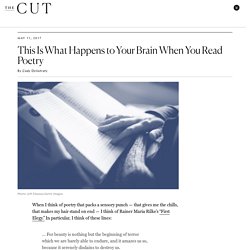
In particular, I think of these lines: … For beauty is nothing but the beginning of terrorwhich we are barely able to endure, and it amazes us so,because it serenely disdains to destroy us.Every angel is terrible. The terror Rilke describes here, at least the way I’ve always interpreted it, is the terror of seeing our world from such a removed perspective that we feel as though we might be able to move beyond existence itself.
Entering this orbit of wider understanding might allow us to finally see our limitations and the complexities of the world, but it is also a state of being that we do not — and cannot — fully understand. Maybe this analysis doesn’t send chills up your spine the way the poem itself might. But how does this poetical pleasure take place? A Poem About What Grounds You. Pádraig Ó Tuama, host: My name is Pádraig Ó Tuama.
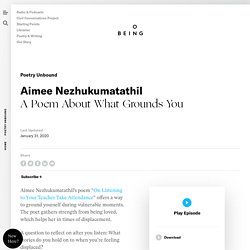
I’m a poet from Ireland, and I think that poetry offers the world something that’s small enough to carry close to your heart and big enough to carry all the ordinary things that can be encompassed in any one day. “On Listening to Your Teacher Take Attendance” by Aimee Nezhukumatathil: “Breathe deep even if it means you wrinkle your nose from the fake-lemon antiseptic of the mopped floors and wiped-down doorknobs.
The freshly soaped necks and armpits. He has a bloody sausage casing stuck between his teeth, handprints on his white, sloppy apron. Your face, no need to flush red and warm. Is one big scallop with its dozens of icy blues and you will remember that winter your family took you to the China Sea and you sank your face in it to gaze at baby clams and sea stars the size of your outstretched hand. Someone once lathered their bodies, once patted them dry with a fluffy towel after a bath, set out their clothes.
Five Tools for Approaching Poetry. A poem is a petri dish for language.
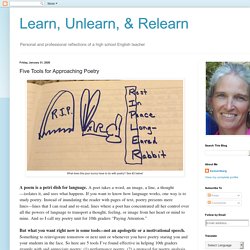
A poet takes a word, an image, a line, a thought—isolates it, and sees what happens. If you want to know how language works, one way is to study poetry. Instead of inundating the reader with pages of text, poetry presents mere lines—lines that I can read and re-read, lines where a poet has concentrated all her control over all the powers of language to transport a thought, feeling, or image from her heart or mind to mine.